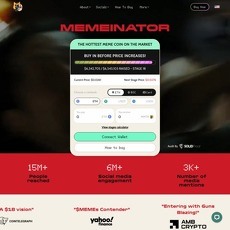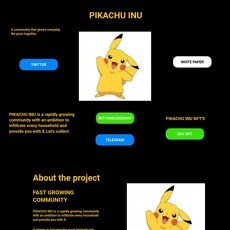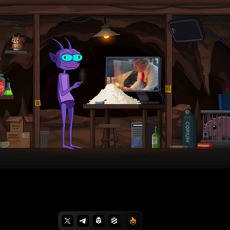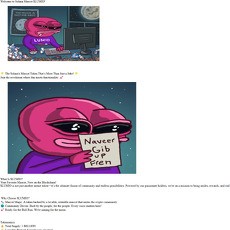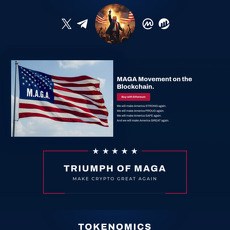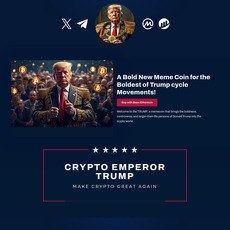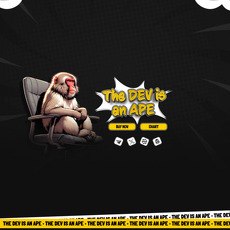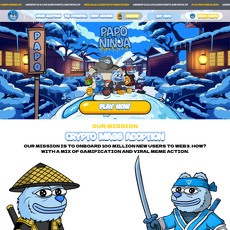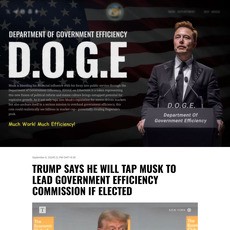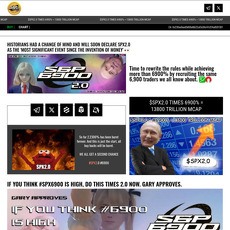passage Review
passage
passage.io
If your website is on the scam list and you think that you are not a scammer, contact us. After you provide us with all the proof that you are in Crypto World with good intentions, we will delist you. Usually, you get in this category because you are hiding your team, you have a bad reputation(you are tricking, deceiving, scamming people), and you haven't got a written project whitepaper or is a shitty one....
Their Official site text:
Our Story
The Passage journey began in 2017 as Enva Division, a creative agency focused on designing custom environments for brands across digital, entertainment, and retail.
These digital environments allowed clients to view, test, and interact with real-world displays in 3D before they were actually built. This made the creative build easier and cheaper, giving teams better tools to put their ideas into action.
Through our work with brands like Warner Brothers Studios, Capitol Records, the Dallas Cowboys, Red Bull, Amazon Studios, and American Girl, we quickly saw the broader potential for these environments as a new frontier of digital experience began to take shape before us.
As the global pandemic forced brands to think differently in 2020, Passage became the solution to meet their evolving needs. During this time, we honed in on creating fun, immersive digital environments that helped our clients connect with and engage their audiences.
The Rise Of The Metaverse
As the world was quickly forced to go virtual, the idea of combining digital and physical realities to create new value, efficiencies, and experiences grew.
Enter the Metaverse, the next iteration of the internet that cohesively integrates the digital and physical layers of reality.
The Metaverse is overlaid by Web3, its value layer. Built on decentralized blockchains that aren’t controlled by any single service provider, Web3 is transparent, permissionless, and immutable, with value and ownership created through cryptocurrencies, fungible tokens, and non-fungible tokens (NFTs).
In 2020, the NFT market was valued at $100 million, and by the end of 2021, it had grown to $25 billion (a 25000% increase).In November 2021, Mark Zuckerberg announced his trillion-dollar bet, rebranding Facebook as “Meta,” with the aim of creating a future powered by Web3 technologies. Others, from Microsoft to Google and Nvidia, soon followed, and in the first half of 2022 alone, over $120 billion was invested in the Metaverse.
There has been a lot of criticism of Meta, in particular, for appearing out of touch with its intended audience. To many, its focus on “getting lost in the Metaverse” sounds like a ploy to continue farming data from its users.
So is the Metaverse just a fad driven by a billionaire and an economic bubble?
We believe there’s something much deeper at play.
Blog
Pitch Deck
OUR STORY
THE FUTURE OF THE METAVERSE
CORE BELIEFS
WORLD BUILDING 101
THE PASSAGE ECOSYSTEM
ROADMAP
TOKENOMICS
The Future of the Metaverse
To understand where Passage is headed, we can look at two major economic shifts driving the concept of the Metaverse forward: the creator economy and the rise of social gaming.
The Next Chapter Of The Creator Economy
The "creator economy" is a business model in which individuals create and sell content, products, or services on the internet. It encompasses a wide range of activities, from blogging, podcasting, and vlogging, to music production and software development.
The creator economy is also defined by the cycle of creators getting noticed on platforms like YouTube, Twitter, Instagram, and TikTok, then building a business around their audience with Lego-like infrastructure (think Stripe for payment processing, Shopify for hosting an online store, etc.).
At least 50 million people worldwide consider themselves creators; of those, 46.7 million consider themselves amateurs. After investment in the creator economy topped $5 billion in 2021, the industry is now estimated to be worth over $100 billion.
From Linktree’s 2022 Annual Creator Report
The platforms available for creators to launch on are crowded and predominantly focused on similar features: video, audio, image, and text posting.
We believe there is a significant demand in the marketplace for platforms that are meeting unmet audiences, and there is one audience in particular that is poised for explosive growth.
The Emerging Demand For Games
Access to mobile devices has created explosive growth in the games market in recent years. In 2020, mobile gaming generated the highest revenue in the global gaming market, which amounted to $77.2 billion. (Wijman, 2020)
While playing games has become more accessible, creating them has remained complex. It takes years of development experience with complicated game engines and other 3D software to create games.
This is not too different from the film industry. In 2006, you still needed knowledge of complicated software and cameras in order to make video content like films and commercials. Today, everything from filming, editing, and distribution can be done with one device and one application like TikTok.
Consider this example that was recently shared with our team:
“Two close friends were contracted to work with Coca-Cola to produce commercials. One was a creator on TikTok who filmed with a couple friends and an iPhone. This filmmaker edited hers directly on her phone, while the other filmmaker used a full crew, production kit, and camera package and spent several days with an editor. Both filmmakers received the same five-figure pay for their projects. Video production has been democratized, and gaming is likely next.”
There are many game engines that are focused on trying to make creating games easier, such as Unreal Engine, Unity, and Godot. Unity in particular launched with the stated mission of democratizing game development. While all of these platforms have made huge strides, they still take a considerable amount of time to learn, and the process of getting your game published holds many hurdles.
Enter Roblox.
The top mobile game by consumer spending is Roblox, a game whose revenue model depends on user generated content. This is the creator economy at work. Roblox is a game that makes it easy for players to create games inside of it. As of January 2023, Roblox has a market cap of 18.83 billion dollars, and its revenue for the twelve months ending September 30, 2022, was $2.215 billion, a 33.39% increase year-over-year. Roblox annual revenue for 2021 was $1.919B, a 107.73% increase from 2020.
According to NPD, of U.S. children ages 2–17 (64 million) play video games, and 73% of Americans ages 2 and older play video games like Roblox. The next generation will not only be native to the creator economy, but they will also be native to online games like Roblox that allow them to participate as creators.
As more creators enter the market and artificial intelligence (AI) tools begin to simplify the process of creating assets, the demand for a “game creator"-focused social platform will explode.
But this isn’t just a young person’s trend. People aged 45–54 account for 63.3% of in-app purchases up to $10. Those aged 55–64, while making up the smallest audience, purchase at a rate of 77.8%.
There is a significant and growing demand for games, and the creator market is primed to be able to meet it—but they will need easy-to-use tools, similar to what creators enjoy on TikTok.
World Building 101
At their core, games are like miniature worlds. Projects like Minecraft and Roblox already use this language to describe the experiences their players are creating.
Over the past five years, our team has developed a unique perspective on how virtual technology changes the way people enjoy entertainment and do business.
We have been hands-on in every area of virtual and physical production, from 3D layouts and rendering to developing core video and audio infrastructure for use in 3D environments.
At one point, all of these areas depended on large teams, but now a single creator can better optimize and make high-quality game content faster.
Being deeply involved in the digital technology around live events has provided us with a unique perspective on the possibilities for virtual worlds, even beyond games. We’ve spent the last two years iterating on our technology, driving thousands of users through our experiences with mainstream brands.
The technology around virtual worlds is evolving rapidly, and we’ve focused on bridging industry level tools like Unreal Engine 5 to enable high quality assets to be brought to our creator community. We have also focused on enabling cloud-based streaming in Passage, so creators and users can access worlds from any device.
AI Is Making It Increasingly Easier To Produce Games
AI is already having a significant impact on game production, and there are several key areas it stands to significantly impact our platform.
Content Creation: Already, we’re seeing AI being used to create written and visual content such as game assets, game levels, landscapes, and other in-game content. Many of these solutions aren't fully automated yet and rely on human QA, but we'll soon see creators using these tools to produce large volumes of assets.
Content Moderation: It is a painstaking process to moderate online communities, but AI can quickly identify and flag inappropriate or offensive content automatically. This can help small teams of creators ensure that their content is suitable for their intended audience.
Personalization: AI is being used to personalize content and recommendations for individuals, which can help creators better target their content and increase engagement.
Testing: Game testing is incredibly time consuming and takes large teams to ensure a game is delivered with minimal bugs. AI projects like modl.ai use an army of AI bots to rapidly play through games to identify bugs and other issues. This can help smaller creators find and fix problems quickly and efficiently.
Player Modeling: Finally, AI is being used to analyze player behavior and preferences, which can help game creators make more personalized and enjoyable experiences in their games.
The Passage Ecosystem
Passage provides an ecosystem for building and connecting virtual and physical experiences through creator-built games.
On its face, Passage is a social network. Under the hood, it’s an open worldbuilding platform with invisible infrastructure for connecting digital / metaverse experiences.
The Passage experience starts with a familiar 2D interface. From there, users can discover and access immersive 3D worlds.
Built with Cosmos, Passage is blockchain-agnostic and offers a suite of tools to make virtual worlds more accessible: in-browser streaming, cross-world commerce for fungible tokens and NFTs, social functionality, and 3D communication infrastructure.
Dashboard: Discover & Experience On Any Device
The Passage Dashboard is where your experience begins. With a familiar 2D interface, the dashboard allows you to easily:
Discover and access Passage-powered worlds
Interact with your connections and communities
Manage your assets, achievements, experiences, and network
Passage worlds can be accessed with one click through a browser on any device, no apps or downloads required.
While the dashboard will initially be launched as a web app, a local client will also be offered to support downloadable worlds, so people can use their own hardware to enter worlds without streaming services.
World Builder: Create Your Open World
Passage offers a set of powerful, flexible tools for creating and connecting immersive 3D worlds.
Templates: Start with a template from our marketplace, then customize your world with 3D assets from our library.
World Builder: Build a fully custom world from scratch, and modify it via a simple drag-and-drop editor.
Plugins: Add custom functionality to your world by accessing our Plugin Marketplace. From game mechanics to ticketing systems and revenue-generating advertisements, Passage plugins transform a world into an engaging experience.
SDK: Connect pre-existing worlds, games, and apps—or create something entirely new in Unreal Engine with our SDK
No matter which industry you’re in, Passage worlds feature everything you need to deliver engaging games and experiences:
Real-Time Streaming: Passage worlds can be accessed from the browser on any device—no apps or downloads required. Streaming happens with cloud compute via AWS, Google, and the decentralized cloud compute network Akash.
Unique 3D Video Chat Tools: Virtual is now more authentic and organic thanks to custom video chat tools. Experience talking face-to-face within a 3D environment, with 3D spatial audio and video.
Immersive Social: Connections, friends, and followers flow seamlessly across 2D and 3D environments.
Instant Commerce: Monetize your world through subscriptions, ticketing and gated experiences, digital and physical goods, and more. Create and sell NFTs with integrated utility in your world.
Stunning Graphics: Built with Unreal Engine 5, Passage worlds feature realistic, high-quality graphics.
Marketplace: Create & Sell 3D Assets
The Passage Marketplace enables users to discover, create, and sell in-world assets.
The open marketplace will host both traditional 3D assets, and eventually tokenized assets (NFTs), in three initial categories:
In-World Assets: Creators can sell 3D art and immersive games to world builders, which can be easily dragged-and-dropped into Passage worlds. This is similar to a stock library, like Envato Elements or Adobe Stock.
World Building Templates: Creators can design entire world templates that can be purchased and used by brands and individuals to host Passage experiences.
Plugins: Creators can create their own plugins and sell them on the marketplace. This is similar to the Shopify or Wordpress plugin marketplace, extending the functionality of the platform to meet the needs of creators.
All assets are subject to a traditional revenue share model with Passage.
NFT creators can set up a royalty between 0–10% at the point of creation, earning revenue each time the NFT is traded.
The Passage Marketplace was launched in Beta in early 2022 on Juno, a network that provides a sandbox environment for the deployment of interoperable smart contracts in the Cosmos ecosystem. Passage was the first NFT marketplace in the Cosmos ecosystem to use the Cosmos ATOM as a medium of exchange.
Relationship Protocol: Connect Decentralized Worlds & Experiences
Passage gives you the ability to move between decentralized worlds, while retaining your digital identity and relationships across each world and experience.
This is made possible by the Passage “Relationship Protocol,” a decentralized social layer that allows you to own your relationships, connections, and achievements.
The Relationship Protocol is a new standard for interoperability.
Social connections and digital goods are stored on the blockchain, so your identity follows you into every Passage-integrated world. With the Relationship Protocol, users can’t be de-platformed. Friends and followers are no longer confined to individual social networks.
As more projects and brands integrate the protocol, the Passage network grows exponentially.
Built on the Cosmos SDK, the Passage blockchain is compatible with every Cosmos chain through the Inter-Blockchain Communication Protocol (IBC). In the future, Passage will expand the Relationship Protocol to support leading networks like Ethereum, BNB Chain, and Crypto.com.
Fostering An Open Platform
Our vision is to create a uniquely open and transparent social platform.
The key elements of our open framework in the Passage ecosystem include the following:
Worldbuilding SDK
Smart contracts
Relationship Protocol
Plugin system


